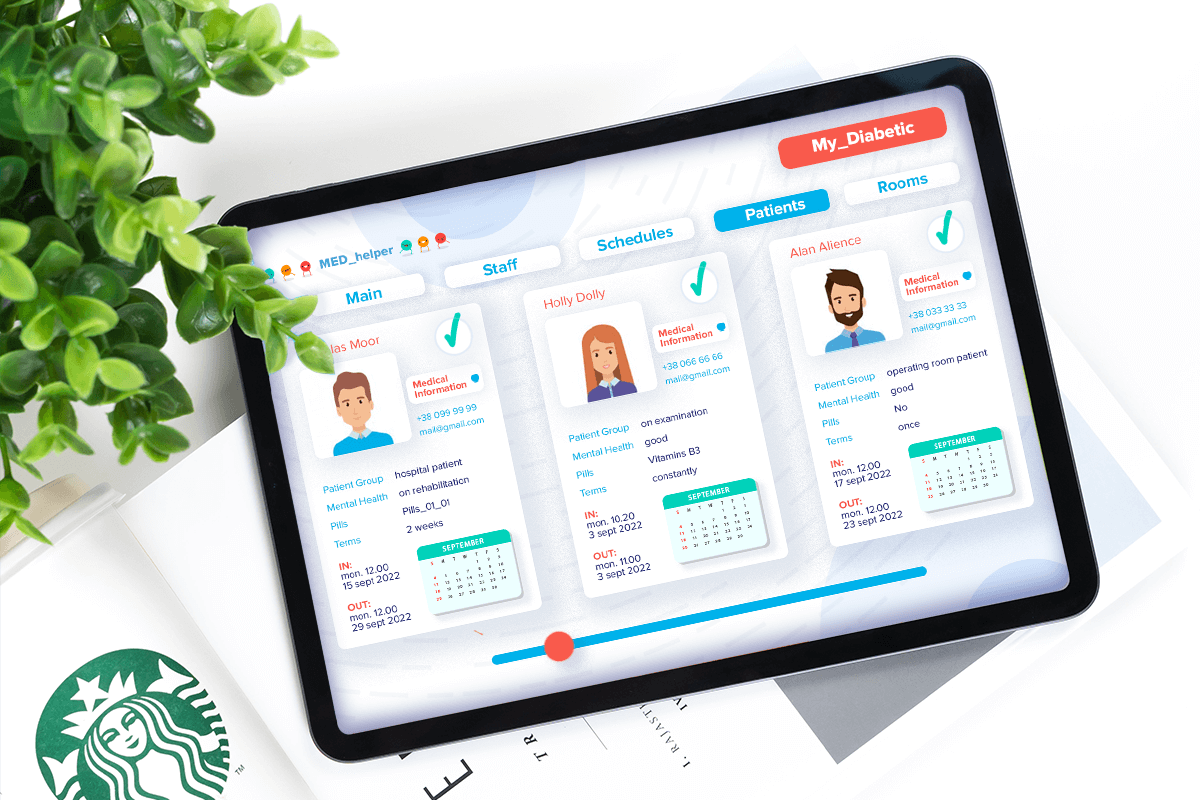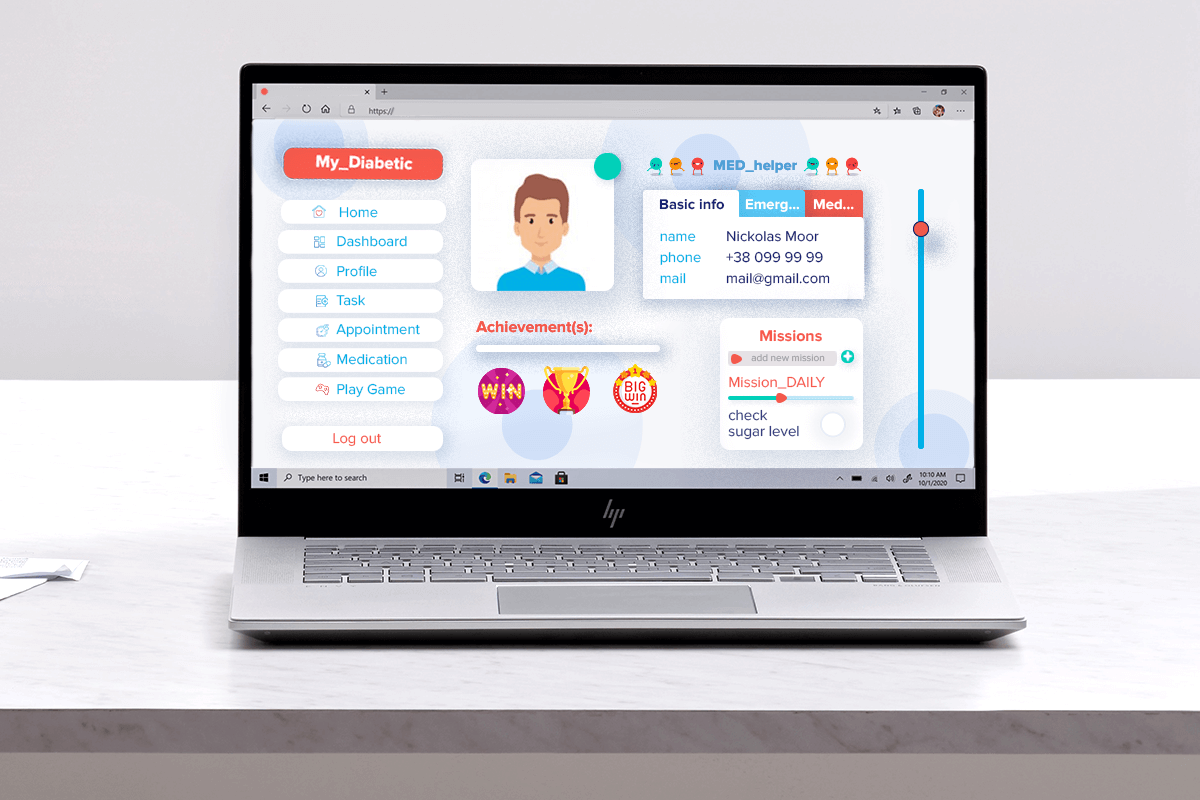Games are vital for human development, even in adult age. They help to relax, get distracted from everyday troubles, and make us feel good! Board games are still very popular, and video games can easily become addictive. Using this knowledge about the nature of games, more businesses implement gamification in their routine processes and operations. For instance, retailers use gamification to train employees, attract more customers, and make the overall shopping process more joyful. Healthcare is not the exception.
According to the American Journal of Managed Care, “Gaming principles can be selectively applied to how care is coordinated and delivered to patients, potentially leading to better outcomes.
What is gamification? Gamification is using game mechanics, methods, and principles in any boring and complex process. So, annoying rules become interesting, and a player is more motivated to achieve a specific goal faster and with better results.

Despite the growing prevalence of smartphones, health-focused digital learning with gamification has only been sparsely implemented in the healthcare industry. However, certain progress has been made in diabetes treatment. Here are a couple of variants of various apps that can be used to improve the lives of patients with diabetes as well as their close people.
Quest Game for Diabetes: Educating Patients and Their Relatives
One of the problems of any disease is the lack of peer-reviewed, reliable information freely available to anyone. Patients, their friends, and relatives often lack trustworthy information about the symptoms, treatment, and mental health problems associated with such a disease as diabetes. Friends and relatives of patients with diabetes don’t know how to react correctly to diabetic emergencies, feel puzzled and scared.
Quest games for diabetes can be an effective solution to the problem of education of people with diabetes and their friends and relatives who take care of them. These quest games are created in order to fill the knowledge gap for the people who know little about diabetes and feel they need to educate themselves.
How Does the Quest Game for Learning About Diabetes Work?
The application generates the diabetic patients’ group for players to cure. Based on the level of difficulty, the application generates additional parameters for the patients: allergies, concomitant diseases, different age groups, and severe mental state. Patients have several health parameters that will drop down with time, and players will use different approaches to keep those parameters in the green zone.
The task of the players is to provide patients with diabetes with the most effective treatment. Players have to choose different combinations of medications, exercise, and mental health treatment because there might be positive as well as negative impacts on the patient’s health parameters, and players will balance the impact with different combinations.

The task of the game is to help users to cure patients and acquire useful knowledge about diabetes in the process of completing the game.
Social and Competitive Features
- Game Leaderboards
To enhance the possibility of success, players will get points and use locational leaderboards to compete with each other. Leaderboards are a popular mechanism for driving competition and stimulating players to study more and do more. For instance, if parents of children with diabetes register in this quest, they will be able to compete in learning more about their children’s health conditions.
- Emergency Situation Training
Emergency situations training has paramount importance for the safety of diabetic patients. From time to time, there will be randomized events with the patient’s health. Players will have to start immediate actions to prevent the consequences. Education through gamification proves to be more effective and less stressful for many consumers. As a result of this emergency, training players will have the necessary skill set and will react with minimum delays and mistakes.
- Social Profiles in the Ecosystem
Each player will have his/her profile with personal information. It will be possible to follow or to be followed and track the progress of each player. Players’ profiles will contain information about their successes, achievements, prescriptions combinations, and profile personalization.
- In-App Currency
For gameplay tasks, daily tasks, achievements, and challenges, players will get the currency that can be spent in the Rewards Market.
- Rewards Market
In-app store with multiple rewards for patients to purchase: healthcare goods, brand materials, app/profile personalizations, gifts for other users
- Combination of Prescriptions
With the Players’ game progress, the application will provide a new treatment for the patients. Players will have the possibility to create prescription combinations for their social profiles and social share.
Using this game, healthcare institutions and pharma companies will be able to educate clients about the peculiarities of the disease and teach them about the right treatment approach. It is possible to show which medications are the safest and the most effective on the market.
The App for Diabetes Treatment Control
Patients with long-term health conditions, such as diabetes, must adapt to new routines and lifestyles, mainly involving their daily activities and dietary intake.
It is difficult for many older patients to stick to the treatment plan created by the healthcare specialist. People tend to forget to take drugs, measure their sugar levels, or avoid certain products and activities that can increase the chances of diabetic emergencies. They neglect physical activity or mental health treatment which often leads to unpleasant consequences.
Mobile application for diabetes treatment control is the most effective tool for higher engagement of people in their treatment. First of all, mobile apps are accessible to anyone who has a mobile phone. Second, they are always accessible in terms of notifications and reminders.

In the app for diabetes treatment control, users can:
- Track their activities;
- Get notifications about medications;
- Get treatment plan updates;
- Check the things that were accomplished.
The application will use the gamification approach for higher users engagement which means that attentive users who stick to their treatment plan will:
- Receive points for the completion of certain tasks;
- Will pass daily quests to learn about their condition;
- Will receive awards for the successful completion of the stages of the treatment;
- Will have all the information about their state of health in a visual format.
Features of the Application:
- Patient’s Profile
Patient’s personal info, achievements, rewards, and treatment progress.
- Social Integration
Possibility to follow or been followed by other users to have shared progress and rewards.
- Dynamic Treatment Plan
Doctors can adjust the treatment plan based on patients’ activities and parameters. The application automatically updates the Daily Quests and Challenges based on the treatment plan adjustments.
- Daily Quests
Specified time-specific tasks and challenges based on the treatment plan with rewards and achievements. Having time-specific events can help patients form strong habits.
Сonclusion
Gamification helps to start perceiving treatment, prevention, and rehabilitation as a game. It can improve patient compliance: taking pills will give you points, and dieting can help you earn badges and compete with other people. The main goal of gamification is to increase adherence to treatment, especially in children.
More than that, gamification in healthcare can bring positive emotions to the process of treatment! A patient can, for a short moment, forget that he has a serious health condition and receive awards for sticking to the treatment protocol. Gamification can be exceptionally effective for diabetes patients, a tiresome condition that requires a lot of effort.
Using gamification, it is much easier to teach relatives and friends of the patient with gamification about the peculiarities of the disease in a more interactive, engaging way.






